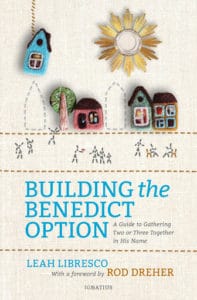Formerly a blogger on the Patheos Atheist channel, Leah Libresco converted from atheism to Catholicism in 2012, and since then has written about spirituality, conversion, and community through the lens of things like mathematics and musicals. Her second book, Building the Benedict Option, details her own experiences plus practical tips on living out a form of intentional Christian community known as the “Benedict Option.” She is a contributing writer for America Magazine, and her writings have also appeared at First Things, FiveThirtyEight.com, and Commonweal.
*****
TJP: Tell us a little about the Benedict Option? What drew you to it?
LL: I like Ross Douthat’s description of the Benedict Option as a religious ratchet—wherever you are, you take one more step toward hospitality and shared prayer. It’s easy to give up fellowship as our lives constrict around us—the Benedict Option is a way to push back against the thinning out of community and friendship.
What do you think is the biggest misconception about the Benedict Option?
The biggest misconception is that the BenOp is a retreat or a purification. Nothing gets simpler when you invite people into your home! The goal is to be better able to extend ourselves, both to the people we want to have in our community and to the ones we’re not so comfortable with. But, to be a channel of grace, we need to think about the source of grace as much as where the grace is flowing out. To spend more time with others, we need to spend more time with God, too. It’s not retreat, but retrenchment.
As you note, many critics do think BenOp is a “retreat,” one that is critical of the contemporary world. For supporters of BenOp, are there lessons to be gleaned from those criticisms? Are there negative tendencies in BenOp that those criticisms might help supporters avoid?
LL: The impulse that pulls people toward desiring a retreat is the belief that the problem is really other people. That if we could just get away from the folks putting pressure on us or who are screwing things up, things would be all right. There’s something to that, sometimes folks are in an untenable situation and need some breathing room to recover. But, withdrawal will never solve our problems completely—wherever you go, there you are, chief among sinners. The true enemy is always sin, and it’s within each of us.
What has been the biggest surprise about living the Benedict Option?
One of the biggest surprises for me was how small people’s unmet longings are (though it shouldn’t have shocked me so much—it’s true of many of my wishes for community, too). When I gathered people to talk about what we wanted from thicker community, people wished to be able to sing with others; to visit a nearby, beautiful church with a friend; in some cases, just to see babies (D.C. gatherings can be pretty age-segregated). These are such small, natural things to want, and it was so hard to find ways to ask for them.
What is the best change you’ve noticed in your spiritual life thanks to the Benedict Option?
I pray more places and with more people. My husband and I have made an effort to have a personal ratchet that, when we hang out with other Christians, we try to pray together. It might be something as short as an Our Father, but so often we’d be together with people and catch up without any prayer shared at all. I want to leave more space and silence for God to prompt us.

You talk about wanting to share your faith with your friends through the Benedict Option, so that God is not just a “private joy.” How have you seen your friendships change (both with believers and non-believers) through the Benedict Option?
Inviting friends to pray with me (and for me!) means I get to be surprised. I get introduced to saints I don’t know, prayers I haven’t heard, hymns I haven’t sung. And when I get these introductions from a friend who loves this form of prayer, I also get to see that friend more clearly as a lover. It’s the best way to deepen my love for them and them for me.
But it’s definitely not all just private joys becoming shared ones. When my friends invite me deeper into their lives (and I invite them into mine), we speak much more about the crosses we experience. In some ways, since I’ve asked friends if I could pray for them, it seems like their lives have all gotten much worse! But what’s changed is what they’ve let me see.
You advise people looking to start hosting Benedict Option events that “your first event should be whatever feels easiest and most exciting to you.” Are there any first-time events that you’ve seen work especially well?
I like to just share a film (Of Gods and Men is excellent) or a play (A Man for All Seasons) because you’re guaranteed to have something to talk about. Just rent the movie (or take a bunch of scripts out at the library), serve whatever is easiest to cook (this is easy), and pick a prayer to say together and you’re good!
I also like “mixtape parties” where you ask everyone coming to bring one good thing to share. We’ve done this telling stories about saints, singing people’s favorite hymns, or having folks bring a memorized poem to recite.
What advice would you have for a pastor or lay minister looking to set up Benedict Option events in their parish?
My advice is to pick things that are a little stranger and more particular than the Young Adult Wine and Cheese gatherings one parish of mine used to have. We were all there just because we were the same age, but there was nothing to concentrate on, so we just had light, meaningless conversations (“Where do you work…”). Give people something a little meaty to discuss or to do, and don’t be afraid that that will narrow the event. It’s better to throw a few narrower events that let people connect than widely (but weakly) appealing ones.
The Benedict Option usually conjures the image of monks in a monastery, but the final image in your book is of friars in the world. What is their significance?
I feel a little bad for St. Benedict, who did get dragged into this without the project having too much to do with him. Alasdair MacIntyre called for a “new and very different St. Benedict” who would imitate the saint in helping people hold onto what God has given us, even in the midst of tumult. Rod Dreher proposed the BenOp as a possible answer to MacIntyre’s call in our times. And I went with the name folks were using! The real connection is that our goal is to be as attentive to what God is asking of us as St. Benedict was and as faithful in following that call, but all the saints have that in common.
Final thoughts?
I’m hoping people don’t finish my book on the first reading, because they put it down to put one of the ideas into practice and forget to pick it up again until they’re clearing off the coffee table just before people come over.
***
Images courtesy Leah Libresco.


